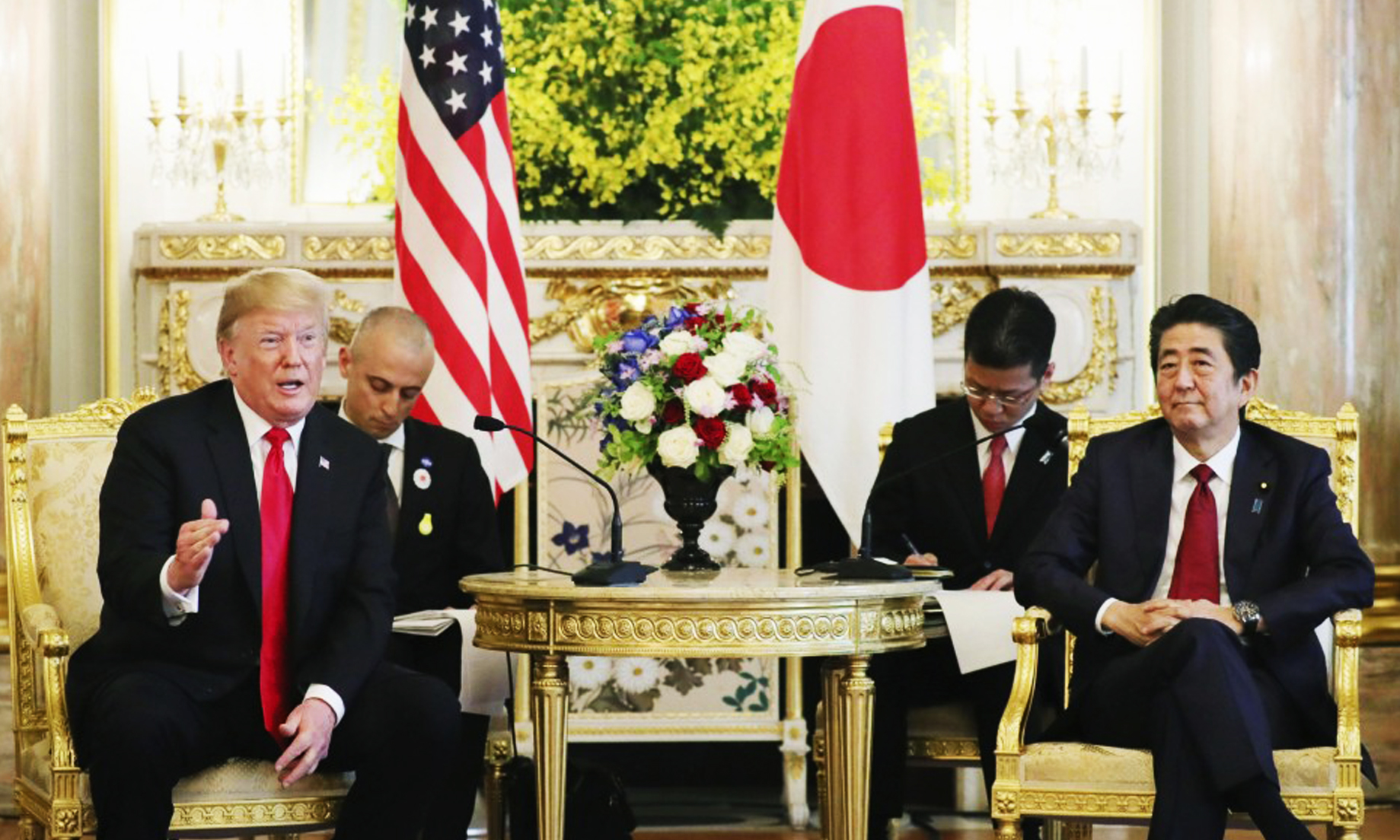TOKYO, May 27 (NNN-KYODO) – U.S. President Donald Trump said Monday he needs to correct a “tremendous” trade imbalance with Japan while meeting with Prime Minister Shinzo Abe, suggesting there may be a major announcement on the issue in August.
“Trade-wise, I think we will be announcing some things probably in August that will be very good for both countries,” Trump said at the outset of the leaders’ meeting in Tokyo, adding both countries will work to rectify what the U.S president sees as a lack of fairness in his country’s economic relationship with Japan.

Prime Minister Shinzo Abe in Tokyo, Japan on May 27, 2019. Photo courtesy of Kyodo
Despite their differing views on trade, the two leaders played golf and watched sumo a day earlier, and their meeting on Monday is otherwise intended to underscore the strength of the long-standing bilateral alliance, with North Korea also high on the agenda.
Abe is hosting Trump on a four-day state visit seen largely as ceremonial rather than substantive, hoping to showcase their close personal relationship.
The U.S. leader is being received as the first state guest of Reiwa, Japan’s new imperial era, and his meeting Monday with Emperor Naruhito, who ascended the throne on May 1, and Empress Masako was one of the highlights.
“I’d like to have in-depth discussions over global challenges such as North Korea, the U.S. and Japanese economies, and coordinate bilateral efforts toward a successful Group of 20 summit” in Osaka in late June, Abe said.
Trump, sitting alongside Abe, said the bilateral relationship has “never been better than it is right now” as both nations are “committed” to each other.
Behind the projection of personal rapport, bilateral tensions over trade are simmering as negotiators have so far failed to bridge the wide gap between them and reach a deal as pursued by Trump, who told Japanese business leaders in Tokyo, including the president of Toyota Motor Corp., that he wants a fair and reciprocal relationship.
Japanese and U.S. officials have downplayed the prospect of a major breakthrough at the summit — the second of three planned over a three-month period.
Trump’s comments came after he tweeted Sunday that “great progress” has been made in trade negotiations but added, “Much will wait until after (Japan’s) July elections where I anticipate big numbers!”

Prime Minister Shinzo Abe in Tokyo, Japan on May 27, 2019. Photo courtesy of Kyodo
Japan has secured some breathing space as the United States delayed higher duties on cars and auto parts for up to six months, though there is a persisting concern that the Trump administration will take advantage of the threat of levies and import quotas to pressure Tokyo into making concessions.
As American farmers have become less competitive due to Trump’s aversion to multilateral free trade agreements, such as a revised Trans-Pacific Partnership from which the U.S. leader withdrew, Washington is urging Tokyo to cut tariffs on farm products such as beef, pork and wheat.
Japan, for its part, has been calling for the removal of U.S. duties on imported industrial products.
Besides the sensitive issue of trade, Abe and Trump will likely agree on the need to coordinate policy on North Korea and to promote a free and open Indo-Pacific region in the face of China’s growing clout.
Abe appears to be hoping to get Trump’s backing for the pursuit of his first-ever summit with North Korean leader Kim Jong Un, given that the prime minister has expressed his readiness to meet him without preconditions.
Abe has shifted from his previous stance that a guarantee of progress on the issue of Japanese nationals abducted by Pyongyang in the 1970s and 1980s is necessary. Trump, who raised the abduction issue in his high-profile summits with Kim, is scheduled to talk to family members of those abducted later Monday.
Raising uncertainty over the Abe-Trump summit, however, is the view that Tokyo and Washington may not be on the same page after North Korea’s recent series of missile launches triggered contrasting responses.
Japan protested to North Korea over the May 9 launches of short-range ballistic missiles as contravening U.N. Security Council resolutions, while the United States downplayed their significance.
Trump tweeted Sunday that North Korea fired off “some small weapons, which disturbed some of my people, and others, but not me,” contradicting his security adviser John Bolton who said a day earlier that the missile tests violated U.N. Security Council resolutions.
The situation in the Middle East will also likely be on the agenda amid an escalating U.S.-Iran standoff. Japanese government sources have said Abe is considering a visit to Iran to serve as an intermediary as Tokyo maintains amicable ties with Tehran.
Abe has held a number of phone conversations and face-to-face meetings with Trump to align their policies while trying to connect with the often unpredictable president by playing golf and watching sumo. Trump plans to visit Japan again for a Group of 20 summit in Osaka on June 28 and 29.
NNN-KYODO






